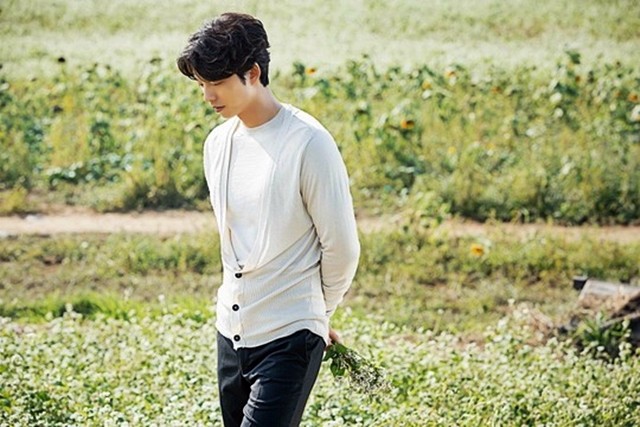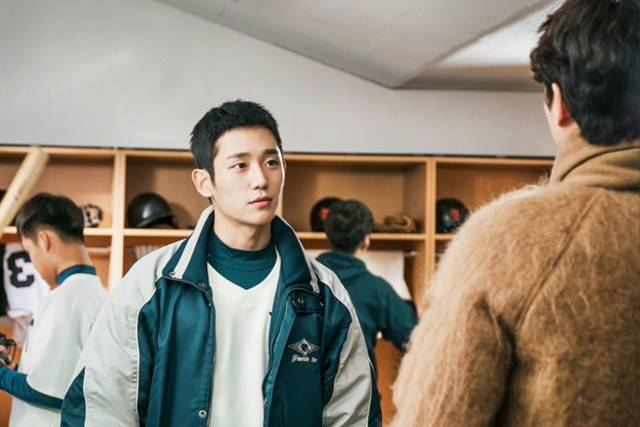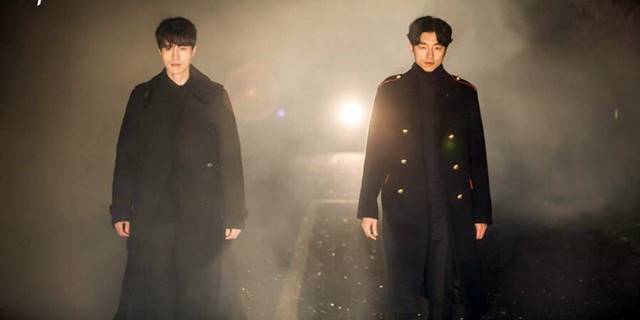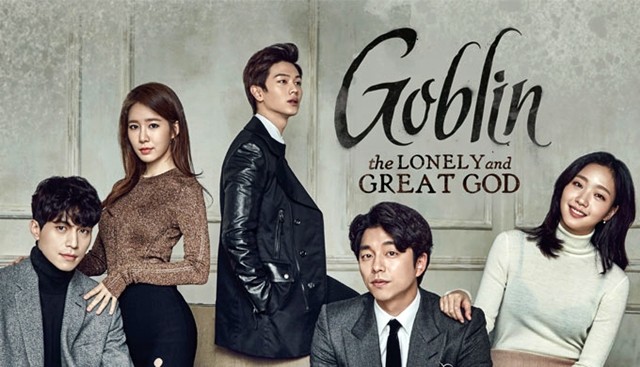By Jae-Ha Kim
Substack
March 8, 2017
![]()
Kim Shin (played by Gong Yoo)
Ji Eun-Tak (played by Kim Go-Eun)
Grim Reaper (played by Lee Dong-Wook)
There are few things in life that would be more difficult than to watch generations of loved ones grow old and die, while you live on for centuries without them.
Such is the case with Kim Shin, a dokkaebi (goblin). For more than 900 years, he has been cursed to live a life of loneliness as atonement for all the enemies he killed during his days as an unbeatable general. Yes, his victims would’ve slain him if they had the opportunity. But, as God says in the narration, they were all precious creations, as well.
The only way for Kim Shin to rest in eternal peace is for the chosen one (aka the Goblin’s Bride) to pull a sword (that mere mortals can’t see) from his chest, which will kill him and release him from this world.
A high school student named Eun-Tak appears to be the Goblin’s Bride. Kim Shin actually is responsible for her being born. Eun-Tak’s pregnant mother was left to die after a a hit-and-run accident. When she prayed for mercy, Kim Shin saved her from death and ensured that Eun-Tak would be born. The problem is that since she was never supposed to be born, she is a marked being, so to speak. She was supposed to die and didn’t, which leaves plenty of paperwork for the Grim Reaper.
As a young girl, it’s obvious that Eun-Tak is different from her classmates. She can see and hear ghosts, who tell her that she is the Goblin’s Bride. She has no idea what they’re talking about until she meets Kim Shin and things falls into place. Whenever she blows out a flame, Kim Shin magically appears before her to help.
And she needs plenty of aid. After her mother died on her 8th birthday, she has to go live with a cruel, abusive aunt who makes her cook, clean and care for her cousins. That aunt has no love for her niece. She only wants to gain custody of her sister’s life insurance money, which will transfer to Eun-Tak when she reaches adulthood. And speaking of adulthood …
Ick Factor:
As handsome as actor Gong Yoo is, he looks very much like the 30something man that he is. At 25, Kim Go-Eun looks youthful enough to portray the 18-year-old high school student. But like “Cinderella and the Four Knights,” this is the latest in a series of dramas where a high school girl becomes the love interest of a grown-ass man. Maybe because Kim Shin is supposed to be almost 1,000 years old and because Eun-Tak is 18, this difference in age isn’t supposed to matter. But it’s still cringe-worthy.

I thought that the relationship she had with Choi Tae-hee (played by Jung Hae-in) actually was very sweet (and much more age appropriate). The star of his college baseball team, he was also her first love. I knew that their relationship wouldn’t go anywhere — it couldn’t go anywhere, because of how fate had already determined Euk-Tak and the Goblin’s lives. But there were times I kept wishing.

Usually when I finish a K-Drama, I write up my review within the next day or so. With this series, I took a couple weeks to digest everything that had happened. The series, which offers some fine performances by the leads, is tinged with sadness. There is an element of doom from the beginning. As God tells Kim Shin (in Episode 8), if he lives, Eun-Tak will have to die, because the purpose of her life was to be born to be his Bride. Her role is to pull the sword out of his chest. He has to die at the hands of the young woman he has fallen in love with.
I was watching the series finale around the same time that I watched a pivotal episode of the NBC series “This Is Us,” where a beloved character died. And I’m not going to lie: it took an emotional toll. One of the things I loved about both these series is how they handled the afterlife, where they showed the deceased being reunited with loved ones who had already passed. In “Goblin,” the Grim Reaper offers the newly dead a cup of tea, which will erase any painful memories they have prior to ascending to heaven. Those who have lived corrupt lives are not given that option.
The romantic elements between Kim Shin and Eun-Tak are supposed to be the driving force of the series. But the bromance between Kim Shin and his sad sack frenemy, the Grim Reaper, were much more engaging to me. Check out this scene where the two strut like runway models to save Eun-Tak after she has been kidnapped:
Now check out the scene below. After Eun-Tak tells them how cool they looked coming to her rescue in their long overcoats, they (comically) recreate the scene after buying some groceries:
Meta moment:
Kim Shin takes Eun-Tak on a date to the movies. He warns her that it’s very scary and that she might get scared. The movie they go to is the immensely popular “Train to Busan,” which was a starring vehicle for Gong Yoo. Eun-Tak, who speaks to ghosts on a daily basis and is in love with a goblin, takes it all in stride. But Kim Shin freaks the eff out, screaming, throwing his popcorn and clutching her for safety.
Airdates:
The Korean cable network tvN ran the 16-episode series from December 2, 2016 until January 21, 2017. Its final episode was the second highest rated series in Korean cable TV history. (The first was the immensely popular “Answer Me 1988.”)
Adoption element:
In the first episode, a young Korean boy (Nam Da-Reum) who has been beaten by his adoptive father attempts to run away from his Parisian home. He runs into Kim Shin, who tells him that if he leaves, his life will be worse than if he had stayed and that he most likely will never see him mother again. He tells the child to go back, look his father in the eyes and tell him that he needs to be raised like his real son. He also needs to tell his mother that she has to help him and intervene.
The boy tearfully asks Kim Shin if he will take responsibility when the cruel father beats and kills him. The Goblin promises that the boy’s dad will suffer from broken ribs and won’t be able to hurt him — he’ll only be able to listen. Just then, the white father comes barreling after him — but he trips and falls over a potted plant that Kim Shin moved into his path.
This is a wonderful vignette for the series — showing how Kim Shin knows what will happen in the future — but I find it incredulous that a pig who beats an adopted child will show mercy, just because that child asked for love. It’s likely that he also beats his wife.
Much later in the series, we see the boy — who is now an elderly man — heading to heaven.

Spoiler alert:
In episode 7, Kim Shin takes Eun-Tak to Canada for a meal. While there, he sees what her future will be like in 10 years. She is at the same restaurant, waiting for a man to join her for lunch. I guessed that she was waiting for him … and I was correct.
The two go through a lot before they are reunited when she is 28. But she sacrifices her life to save a bus-load of kindergarteners. The series ends years later, when a high school girl shows up at the gravesite where Kim Shin is mourning. She is the reincarnation of Eun-Tak. It’s sweet — but, again — why does she come back as another school girl?
Those who become Grim Reapers are said to have committed the biggest sin. We learn that the sin is suicide. The Grim Reaper was once a naive and insecure king, who listened to a manipulative and evil eunuch. Convinced that Kim Shin was a threat to his throne, the young king ordered the deaths of his wife (Kim Shin’s sister) and Kim Shin. Besotted with grief, he knowingly drank medicine that had been poisoned, thereby dying by suicide.
© 2017 Jae-Ha Kim | All Rights Reserved


I find that adoption is often handled clumsily, at best, in Korean dramas. As much as I love them, I cringe when adoption is portrayed. Everything from the evil, calculating, first mother to the adult adoptee who was always second class in his/her adoptive family and seeks desperately for his/her “real” family. Sensationalized adoptive themes are an over used plot trope…. But, maybe, as an adoptive mom, I am hoping for/expecting too much. Adoption is complicated, and, searching for birth connections doesn’t mean you had a disconnected adoptive family. And, to your point, an abuser will not be changed because you tell him you need love. Abusers abuse…. I would have liked the Goblin to have helped the boy and mom leave the situation…. Ugh….
Unlike · Reply · Message · 1 · 45 mins
The way Korean dramas handles adoption is always offensive. It’s obvious why culturally adoption is so rare if you look at the language and attitudes expressed in them.
There’s was one I watched where a woman finds out she’s adopted and the adoptive mom says she has to give her daughter up and give her back to the birth mom because that’s where she belonged. She said this and acted on it even though her daughter did not want to. It was ridiculous.
As an adoptive mom, I’m always on the lookout for things to share with my children. (They’re not Korean, but we do love our Korean dramas!) Is it that art is emulating culture, or is culture following art?
I’m not an adoptee, so I can’t offer that kind of perspective. But I’ve been less offended by the way KDramas address adoption than Hollywood productions aimed at children, such as “Despicable Me” (where orphans are literally returned like unwanted merchandise) and “Annie.”
Cavaet: I’ve only started really watching Korean dramas for the past year or so, so I’ve seen and reviewed maybe two dozen. The sense that I got from those was that they were projecting what was happening in society, rather than what should be happening. I’m not sure if either of you watched “Doctor Crush,” but the male lead was adopted by a rich doctor. His enemies kept saying that he (the adoptee) wasn’t a threat for power in the hospital that the rich man owned, because he didn’t share his father’s “blood.” But, the rich father considered his adoptive son to be his son. Period.
In “Oh My Venus,” the MMA fighter was abandoned as a baby and had an incredibly difficult life fending for himself. After he was reunited with his mother, we learn that she killed her abusive husband out of desperation. She gave birth to her baby when she was in prison and then lost custody of him, and he was raised in an orphanage. After he won fame as Korea’s most famous fighter, he donated most of his earnings to various unwed mothers’ group. I felt that this was the show’s way of addressing the complicated issue of single mothers often being forced to give their children up for adoption, because there is next to no social welfare set up to help care for the children. (The thing I really disliked was that the mother was involved in another abusive relationship, but there was a “happily ever after” ending because the husband was getting treatment for whatever his issue is (alcohol? anger management?). I’d like to believe that’s the solution, but the better resolution would’ve been for her to move out and into her own place or with her son.)
In the “Coffee Prince,” Gong Yoo’s character, Han Kyul, grew up thinking that he was his father’s illegitimate son. He later learns that his father was in love with a woman, but didn’t marry her because Han Kyul’s grandmother forbid it. The dad’s friend ended up marrying the woman, had a baby with her and left the marriage. She died shortly thereafter. Han Kyul was placed in an orphanage, until his adoptive parents got custody of him and raised him as their own. (The thing that bothered me about this wasn’t their treatment of him but, rather, that everyone kept it a secret from him until he was 29.)
This is a really interesting thread of comments. Thank you all for sharing. Is the crappy portrayal of adoption in Korea any different from the crappy portrayal of adoption in the U.S.? I’m not saying that’s an excuse (in either country), but adoption has always been singled out as a joke in American pop culture it seems.
Just to be clear, I’m an adoptive mom… So, I’m part of the adoption triad but not an adoptee. I can’t speak for my son, or any other adoptee. But, I feel that adoption is mishandled in most pop culture settings….It’s an easy trope to use to manipulate emotions and “explain” things. I don’t like Annie and Despicable Me has problems.
Society, as a whole, has trouble accepting adoption as equal to being born into a family… There are a number of “adoption” jokes that are offensive. The complicated relationships that adoption creates are hard to understand and portray. So, they are often simplified…. Getting adopted is not a happily ever after scenario and searching for birth families doesn’t mean you had a miserable childhood…. But, adoptive families have been trying to educate the general public, with limited success, for years.
I did like the relationship in Dr. Crush… His dad was his dad… And, that was beautiful. I do appreciate that dramas are making commentaries about society… But, I think the rare drama, the daring dramas, are the ones doing that… Oh My Venus was a commentary on the image obsessed nature of Korean society, so it’s not a large stretch to include the social stigma of single motherhood in with the overall vision.
Many, many dramas stick to old “tried and true” formulas. And, truth be told, those aren’t my favorites but, seem to succeed in ratings and earnings….